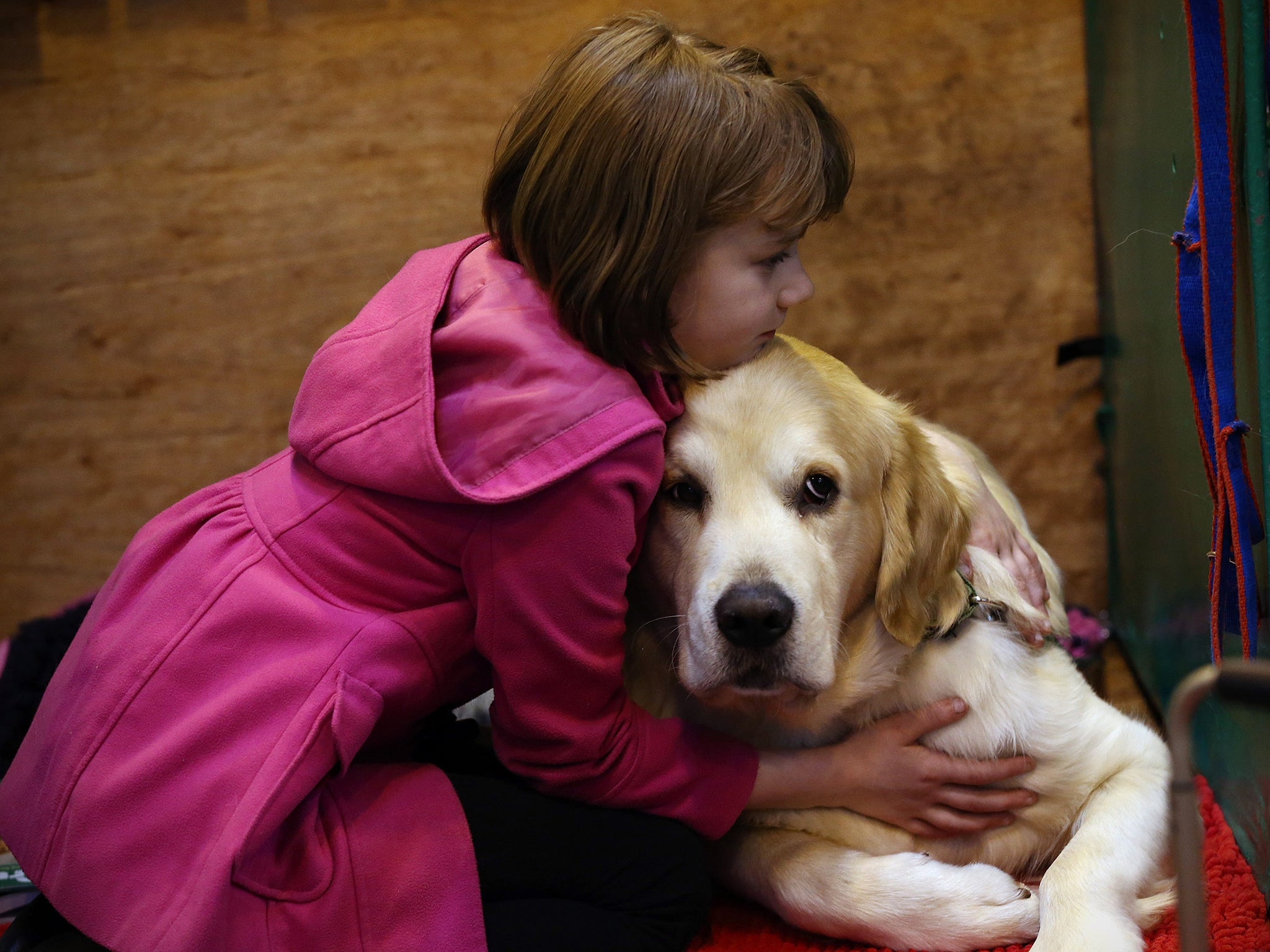Children 'less likely to suffer' asthma if they grow up around dogs
Study finds children who have dogs in the house had about a 15% decreased risk of developing the condition

Your support helps us to tell the story
From reproductive rights to climate change to Big Tech, The Independent is on the ground when the story is developing. Whether it's investigating the financials of Elon Musk's pro-Trump PAC or producing our latest documentary, 'The A Word', which shines a light on the American women fighting for reproductive rights, we know how important it is to parse out the facts from the messaging.
At such a critical moment in US history, we need reporters on the ground. Your donation allows us to keep sending journalists to speak to both sides of the story.
The Independent is trusted by Americans across the entire political spectrum. And unlike many other quality news outlets, we choose not to lock Americans out of our reporting and analysis with paywalls. We believe quality journalism should be available to everyone, paid for by those who can afford it.
Your support makes all the difference.Children are less likely to suffer asthma if they grow up in a household with a dog compared to children in families without a pet canine, according to the largest study of its kind into the relationship between the respiratory disease and early exposure to animals.
The study, carried out on a national databank of more than 1 million children born in Sweden between 2001 and 2010, also found that asthma was about half as common in children regularly exposed to farm animals compared to the typical population.
The findings support the “hygiene hypothesis” of immune-related illnesses such as asthma, which postulates that exposure to dirt and microbes in early childhood may prevent the immune system from “over-reacting” in a way that triggers allergic or auto-immune disorders.
Swedish scientists cross-linked the country’s national medical records system, which identifies every person from birth through a unique ID number, with Sweden’s dog-licence register to analyse the relationship between dog ownership in the first year of a child’s life and the incidence of asthma in children up to the age of six.
They found that children who since birth have grown up with dogs in the house had about a 15 per cent decreased risk of asthma by the time they attended school compared with children whose families did not have a dog, according to the study published in the journal JAMA Pediatrics.
The link between early exposure to animals and a decreased risk of asthma was even more pronounced in the children of registered farm-animal workers, who had a 52 per cent reduced risk of the disorder in school-aged children and a 31 per cent reduced risk in preschool-age children.
“Earlier studies have shown that growing up on a farm reduces a child’s risk of asthma to about half. We wanted to see if this relationship was true also for children growing up with dogs in their homes,” said Tove Fall, assistant professor of epidemiology at Uppsala University.
“Our results confirmed the farming effect, and we also saw that children who grew up with dogs had about 15 per cent less asthma than children without dogs,” Dr Fall said, adding that the researchers eliminated possibly confounding effects such as socio-economic status, place of residence or whether parents also suffered from asthma.
The study is the biggest of its kind given that it analysed the health records of 376,638 pre-school children and 276,298 school-age children, and identified about 75,000 children in the two groups who were regularly exposed to either pet dogs or farm animals since the first year of their lives.
Dr Fall said that the main message of the study is that new parents who already have dogs should not be worried about their pets being in contact with young children, but that acquiring a dog after a child has already developed asthma will not treat the condition.
“You shouldn’t worry if you have a dog if you are pregnant or have a small baby, but you shouldn’t think of getting a dog in order to cure asthma in your children. You shouldn’t be afraid of having a dog in the house, but we do not yet know why having a dog appears to lower the risk of asthma in young children,” Dr Fall said.
Some children develop allergies to dogs or cats and they should avoid being exposed to them, according to Catarina Almqvist, a clinical epidemiologist at the Karolinska Institute in Stockholm, who collaborated in the study.
“These kinds of epidemiological studies look for associations in large populations but do not provide answers on whether and how animals could protect children from developing asthma. We know that children with established allergy to cats or dogs should avoid them, but our results also indicate that children who grow up with dogs have reduced risks of asthma later in life,” Dr Almqvist said.
The researchers believe the findings should also apply to other developed countries, but do not have any evidence to suggest that it is also true for pet cats.

Hygiene hypothesis
No-one can explain why there has been a significant rise in childhood allergic diseases such as asthma, eczema and hay fever, as well as an increase in auto-immune diseases where the body’s immune defences start to attack healthy tissues rather than their natural targets – invading parasites, microbes and viruses.
This increase in the West has not been mirrored in developing countries where children are regularly exposed to truly nasty parasites and pathogens such as tapeworms and malaria. Some scientists have suggested that there may be a link between the increase in allergies and reduced microbial exposure in early childhood brought about by better hygiene – the so-called hygiene hypothesis.
The idea is that by being exposed from an early age to the kinds of germs that are immune system has evolved to attack, there is less chance of the immune defences going awry and focussing on healthy tissue or harmless “allergens” in the environment, such as house-dust.
However, scientists are divided on this and few would recommend that parents should relax their hygiene standards to the extent of deliberately exposing their children to dirt and harmful infections. The latest study has shown for instance that exposure to farm animals lessens the risk of asthma, but some children are known to have become seriously ill from E. coli passed from livestock.
Likewise, children in Africa may suffer less from asthma and hay fever than children in Britain, but they die in their thousands from microbial and parasitic infections caught as a result of poor hygiene.
Join our commenting forum
Join thought-provoking conversations, follow other Independent readers and see their replies
Comments